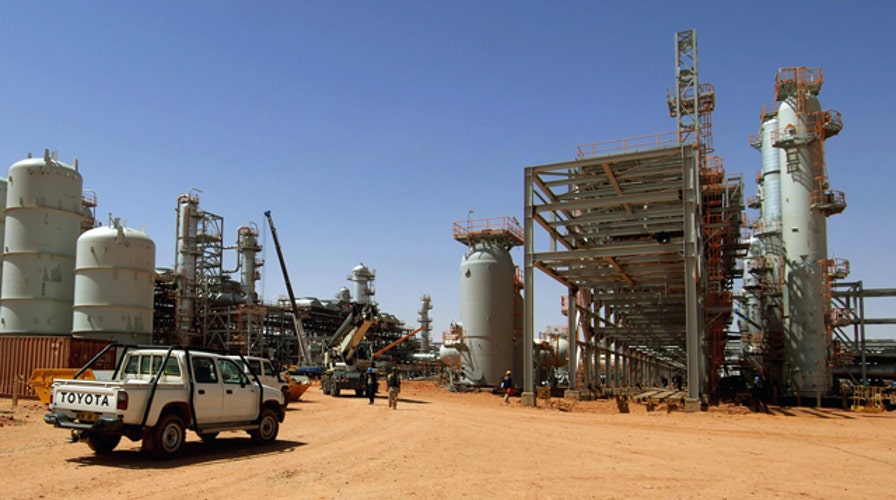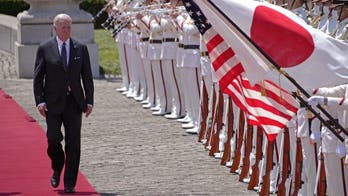The scope of the developing hostage crisis in Algeria appeared to take the U.S. and other countries whose citizens were targeted by surprise, but two top lawmakers tell Fox News that the attack likely involved significant planning.
"Everything that I see would indicate to me this was a planned operation for some time," House Intelligence Committee Chairman Mike Rogers, R-Mich., said, adding he believes the Al Qaeda-linked group did surveillance on the natural gas plant before storming the facility.
As the crisis continued to unfold Friday, there were conflicting reports about the number of casualties, and officials in Washington were scrambling to get a handle on the details. Late Thursday, Algerian media said the country's special forces had finished the operation to free hostages, but within hours it was reported that the stand-off was ongoing. Dozens of hostages were unaccounted for.
"This is an ongoing situation, and we're seeking clarity," White House Press Secretary Jay Carney said earlier Thursday, while condemning the "terrorist attack" in the "strongest terms."
"We, frankly, do not have a lot of new information to share with you at the moment," State Department spokeswoman Victoria Nuland said.
Fox News has confirmed that two Americans were among the hostages who escaped from their kidnappers unharmed and were en route to London. But at least one American was still missing.
Meanwhile, militants reportedly claimed that 35 of their hostages were killed during an earlier Algerian rescue attempt -- that claim could not be independently confirmed.
But British Prime Minister David Cameron indicated there would be casualties, saying the public should be prepared for "very bad news."
Rogers and Rep. Ed Royce, R-Calif., chairman of the House Foreign Affairs Committee, both said they think the attack was premeditated -- and that the planning started even before the French military operation in Mali over the weekend. Some have claimed the attack was in retaliation for France's military intervention in Mali, but the U.S. lawmakers suggested the Al Qaeda-tied group simply pulled the trigger on an operation that was already in the pipeline.
"It's clear that they began this operation before the French began ... to send the French foreign legion in, so this operation has been planned for some time," Royce said. "Clearly, I think it's a demonstration of the resources they have at their disposal and also, shall we say, the determination that Al Qaeda in the Maghreb is showing with respect to their ends in North Africa."
The former head of France's spy service also reportedly claimed the operation was "conceived well in advance."
The attackers are thought to be tied to Al Qaeda in the Islamic Maghreb, a group in North Africa said to have growing influence.
Royce told Fox News that the group "is the fastest-growing Al Qaeda operation" in the world, with agents or cells in Switzerland, France, Germany, Britain and in Spain.
While Royce said the administration had worked to support the counterterrorism efforts of local governments in North Africa, Rogers said the administration's approach to the Al Qaeda problem in the region remained lacking.
"We don't have overarching policy, so we're playing firefighter," he said. "So Mali breaks out, we'll try to play firefighter there. Libya has problems, we're clearly playing firefighter there after the Benghazi event that killed the ambassador."
The hostage crisis comes after terrorists attacked the U.S. diplomatic compound in Benghazi last September.
House Homeland Security Committee Chairman Michael McCaul, R-Texas, said the hostage crisis demonstrates "the continuing rise of Al Qaeda in North Africa and the seriousness of the threat it poses against the United States and the West. "
He warned that the region provide a "launching pad for terrorists" and could ultimately be used to plot attacks "against our homeland."
The specific group claiming responsibility is Katibat Moulathamine, supposedly led by Al Qaeda operative Moktar Belmoktar -- whom militants reportedly claim has been killed in the standoff.
Belmoktar had branched out somewhat on his own. In December, Belmoktar announced he was setting up his own operation, while making clear that he remained tied to the old guard of Al Qaeda leadership.
Congressional sources briefed on Al Qaeda in North Africa describe what is becoming an arc of instability that now stretches from Yemen in the East -- where Al Qaeda in the Arabian Peninsula is based - to Somalia to North African countries like Libya and Algeria.
"If we don't deal with these militant groups and terrorists swiftly and effectively, they will only pose an increasing threat in the future as they already have in Benghazi and now Algeria and Mali," Rogers said in a statement.
Fox News' Catherine Herridge contributed to this report.





